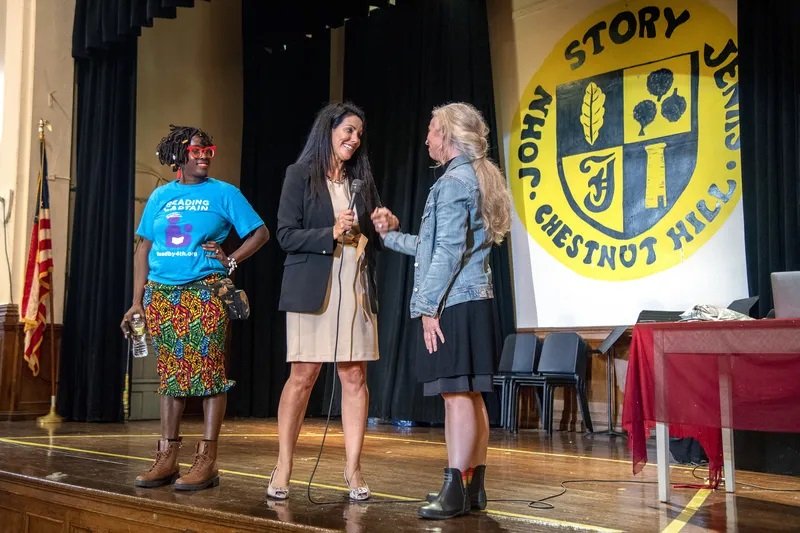From The Philadelphia Inquirer, October 18, by Kristen A. Graham, photos by Tom Gralish, staff photographer
David Caulk, a parent and member of the Chestnut Hill Community Association, reads with his son David Arlo, a kindergartner at the John Story Jenks Academy for Arts and Sciences, a K-8 public school in Chestnut Hill, in the newly reopened school library.
It took a year, thousands in donations, hours of volunteer time, and a massive amount of planning. But as of this week, John Story Jenks, the public school in Chestnut Hill, pulled off a feat — it reopened its long-closed school library.
The library was open for business Thursday as part of Reading Promise Week, a book-filled celebration at the K-8 school on Germantown Avenue.
“May you continue to love reading, because it opens up every door possible,”Principal Corinne Scioli told the children who gathered at Jenks to celebrate books.
Wearing leis, volunteers Laurene Topping (left) and Kendal Berry (right) handed out reading swag to students at the John Story Jenks Academy for Arts and Sciences,a K-8 public school in Chestnut Hill, as they celebrated Reading Promise Weekand family literacy after school on Thursday.The Jenks community also celebrated the reopening of its school library.
The event was joyous, and uncommon: In a district of 216 schools, just four have certified librarians. A few dozen — now including Jenks — have libraries open part-time through volunteer partnerships, but are not professionally staffed.
Compare that to 1991, when the district employed 176 librarians. It’s unclear when Jenks’ library was last open.
Prather O’Donnell, parent of three children who attend Jenks, spearheaded the effort to reopen the library. It’s a vital resource, not just for kids at Jenks, but children citywide, said O’Donnell, who’s also the children’s librarian at the Chestnut Hill branch of the Free Library.
While the number of school librarians nationwide is declining and schools in lower-wealth districts often cut librarians, the private school up the street from Jenks has three separate libraries and multiple librarians, and “the deficit Philly schools have in comparison to that resource is heartbreaking,” said O’Donnell.
That said, “something is better than nothing,” said O’Donnell. (The Jenks library will be open four hours a day, with a combination of volunteers and a staff point person.)
Roberta Frempong, president of the Jenks Home and School Council, celebrates during Reading Promise Week The Chestnut Hill public school held an event marking the week and the reopening of its school library.
Philadelphia Superintendent Tony B. Watlington Sr. recently declared his desire to revitalize school libraries.
“We are in conversation with the Free Library of Philadelphia about a potential partnership to fill some immediate gaps with libraries and librarians in our schools,” Watlington said in September. But the city library director warned he is having trouble filling jobs and keeping the Free Library’s branches open five days a week.
The district “is committed to creating life-long readers by promoting literacy and independent reading and providing students with access to books,” spokesperson Marissa Orbanek said. The school system provides classroom libraries for students in grades K through 5, Orbanek noted, and provides each student with a Chromebook to “support media literacy, information literacy and digital citizenship instruction,” among other measures.
Philadelphia has the worst ratio of schools to school librarians in the country, according to the Pennsylvania Association of School Librarians. The district allows principals to use their budgets to employ librarians, but that’s a luxury almost no one can afford.
“That is always the conversation — the school district says, ‘Principals are able to do it.’ The principals say, ‘There’s absolutely no way,’” O’Donnell said. “How do we change that conversation so that it doesn’t just stop right there?”
Roberta Frempong (left), president of the Home and School Council, looks on as Jenks principal Corinne Scioli (center) thanks Prather O’Donnell (right), the children’s librarian at the Chestnut Hill branch of the Philadelphia Free Library during presentations in the auditorium.
At Jenks, the library came together over about a year, Scioli said at Thursday’s event, “through the work of a lot of our friends” — grants from the Chestnut Hill Community Association and Friends of Jenks, books from Hilltop Books, a donation from the Chestnut Hill Rotary, and sweat equity from many volunteers. Scioli said she dedicated $3,000 from the school budget, also.
“We are so very fortunate here at John Story Jenks Academy for Arts and Sciences to have such a committed community that is willing to come together, roll up its sleeves, and make magic happen,” said Scioli.
But Jenks sits in an affluent community that has the ability to bring in outside resources. Many other district schools are not in such a position.
Jan LeSuer, president of the Friends of the Chestnut Hill Library, said his group was moved to help organize around the Jenks library because of students’ lost learning time during the COVID-19 pandemic.
“It really struck us as a crisis,” said LeSuer. Putting books in kids’ hands seemed one way to help.
And though this effort is about one school, one library, attention needs to be paid citywide, LeSuer said.
“To not have libraries, to have let them languish, to let them disappear, to not have them staff is just appalling,” said LeSuer. “Libraries are critical to the whole city fabric, and fundamental to education.”






